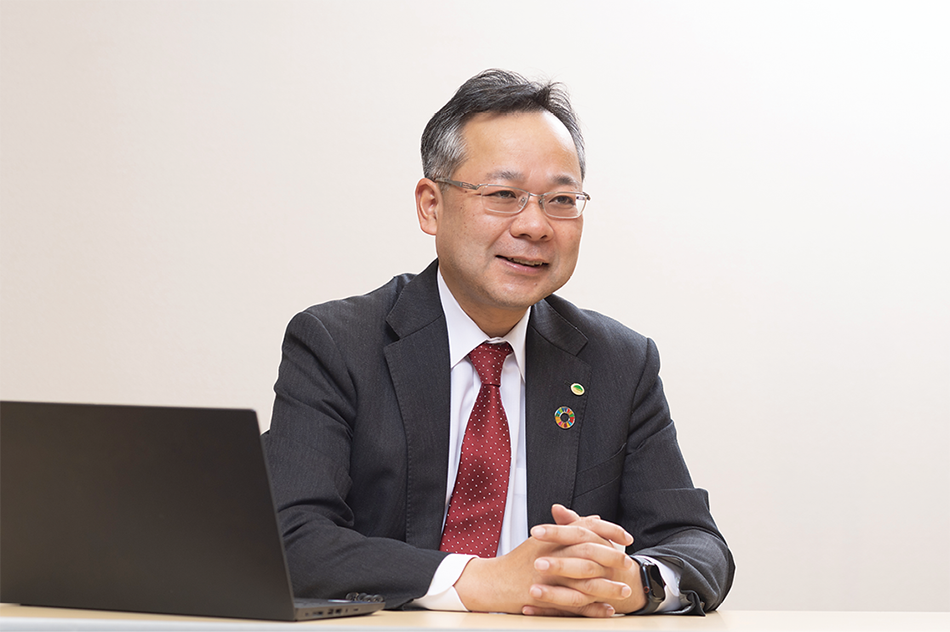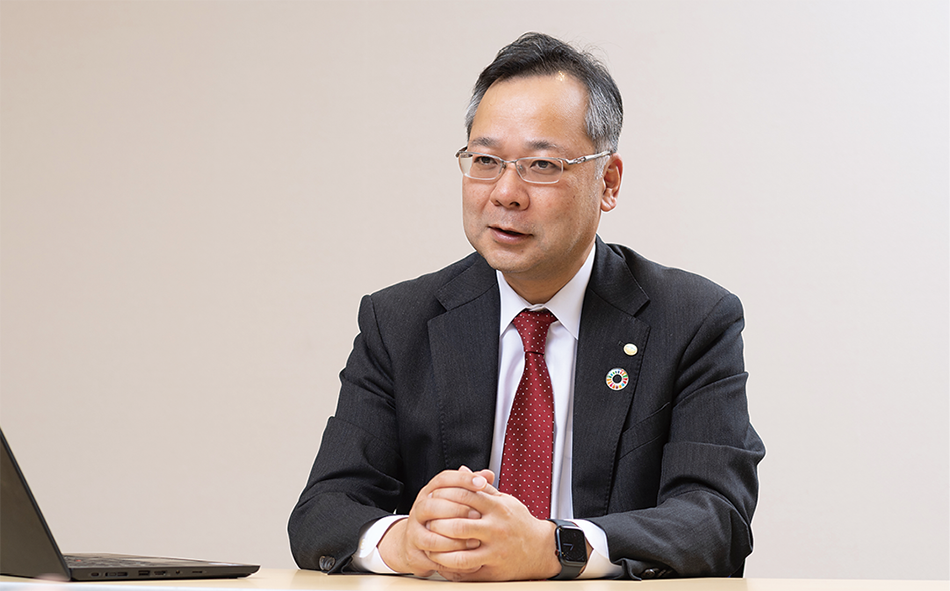COVER STORY:ACTIVITIES 1Benefitting Society with Value Created through Digital TechnologyHow Hitachi Digital is Working to Combine Sustainability and QoL
Highlight
The Mid-term Management Plan 2024 published by Hitachi, Ltd. in April 2022 described a growth strategy driven by digital business, with Lumada playing a central role. To achieve this and accelerate digital business activities across group companies worldwide, Hitachi Digital LLC, a company established that same month, is pursuing a global digital strategy it devised for Hitachi while also strengthening its collaboration with other group companies. For this article, Hitachi Review spoke to Hitachi Digital CEO, Jun Taniguchi, about why the company was established, what role it will play, and its partnership with GlobalLogic Inc., a company that became part of the Hitachi Group in 2021.

Collaboration between Business Units Essential to Global Expansion of Lumada Business
 Jun Taniguchi
Jun Taniguchi
CEO, Hitachi Digital LLC
Joined Hitachi, Ltd. in 1995. He was appointed President, Hitachi Global Life Solutions, Ltd. in April 2019, Vice President and Executive Officer, Hitachi, Ltd., COO of the Services & Platforms Business Unit, and CEO of Hitachi Digital LLC in April 2022. He became CEO of the Digital Engineering Business Unit and CEO of Hitachi Digital LLC in April 2023.
Hitachi Digital was established in April 2022 to formulate and execute a global digital strategy for the entire Hitachi Group. Please tell us about why the company was established and the role that it will play.
In our Mid-term Management Plan 2024, Hitachi set a goal of becoming “a global leader in Social Innovation Business,” announcing a further acceleration in our Social Innovation Business based around the three pillars of “Green, Digital, and Innovation.” In the world of today where customers and wider society are experiencing rapidly changing conditions, it is important for Hitachi to clearly identify the business sectors we intend to focus on, especially in our digital business. Hitachi has a track record of supplying reliable and high-quality social infrastructure. That is a major strength for us and our intention is to continue focusing on this field while also utilizing our digital capabilities to provide better user experiences.
On the other hand, what marks out the digital business is that even more value can be created by combining expertise in different areas like design, engineering, products, and managed services. What customers are looking for from Hitachi is that we generate synergies by drawing on these various forms of expertise. To achieve this, we need to create new value by developing digital business strategies that span our many different business units (BUs). A key role of Hitachi Digital is to lead this value creation process while using Lumada as a platform. In that regard, we also serve as a control tower for accelerating the global deployment of Lumada.
How did you feel about being appointed CEO?
I felt a very heavy responsibility. This is because Hitachi’s growth depends on how well this company functions. We need to break out of the existing practice whereby each BU has managed its duties with a spirit of autonomy and self-reliance. That is to say, we need to overturn accepted wisdom. I don’t imagine that this will happen easily. On the other hand, it is an opportunity for me to draw on my own experience in business creation and in our IT, operational technology (OT), and product businesses and management. Although it is an onerous responsibility, I am committed to promoting growth based on an appreciation of the viewpoints of the different BUs that draws on my own experience.
It has been the practice at Hitachi in the past also to create new value through different BUs working together in ways that give Lumada a core role. Is it your intention to strengthen this approach on a more global basis?
Yes, it is. One of the big changes we made in FY2021 was bringing onboard GlobalLogic Inc., a leader in design-driven digital engineering. With the addition of ABB’s power grid business (now Hitachi Energy), which has the world’s top-class technology and market share, to the Group in 2020, there has already been a move to spread the Lumada business globally, and we will further accelerate this trend with GlobalLogic.
To achieve this, we need more than ever before to focus our energy on creating value for customers without being caught up in the demarcations between BUs. One specific measure aimed at doing so is a review of how we handle assessment, something that has become a bottleneck for BUs working together. Whereas past practice was for each BU to set its own targets and assess how well they were achieved, we are now developing practices whereby we will make a point of also assessing the outcomes of work undertaken on the basis of cooperative and collaborative arrangements between different BUs. By demonstrating such a new management mechanism, I believe that the entire Hitachi Group will develop a mindset of providing greater value to customers than ever before.
Why base the business in Silicon Valley?
Why did you choose to base Hitachi Digital in North America?
As our target is the rapidly growing global digital transformation (DX) market, we felt that it made sense to locate ourselves in North America where the market is particularly large. As you know, North America is recognized as a market where the pace of technology is fast and where solutions advance and evolve at a rapid rate. Our aim is to adopt the best practices from this market as we expand and operate our Lumada business.
It has been already more than 10 months or so since I relocated in my role as Chief Executive Officer (CEO) and I have been really enjoying my work. The west coast of the USA is where specialists from many different parts of the world congregate, with a deeply rooted culture of resolving the concerns of customers and wider society alongside mutual understanding and respect for people’s different value systems. As Silicon Valley is also a hub for world-leading technology, the many opportunities to encounter such technologies adds to the attraction.
So, you get to engage with a wide variety of venture companies and other businesses?
Yes, that is right. At the University of California, Irvine last fall, I had the chance to meet with leaders from academia and from companies that are a global driving force in digital business. One of the things that sets Silicon Valley apart from other areas is the relative ease of communicating with people who play leading roles in digital technology globally.
Another key consideration in our choosing to base ourselves in North America is that digital capabilities are of overwhelming importance to Hitachi as we seek to become a global leader in social innovation. In our activities that use IT to integrate OT with products and deliver value in ways that are distinctive to Hitachi, basing ourselves in the international hot spot that is Silicon Valley is a statement of intent on our part, indicating the even greater effort we intend to put into the digital field.
Role and Expectations for GlobalLogic

As you mentioned before, GlobalLogic became part of Hitachi in July 2021. Given that the idea is to combine the capabilities of GlobalLogic with Lumada to supply fully featured digital solutions globally, what specific expectations do you have for the company?
In a word, I want it to serve as a trigger for transforming the culture and business model of Hitachi. At the same time, I also believe that a very strong affinity exists between Hitachi and the culture at GlobalLogic. I got together with several dozen of the leaders at GlobalLogic shortly after being appointed CEO in April 2022 to discuss the company’s strengths and the wellsprings of its growth. While they expressed its strengths in different ways, all agreed on the three common elements of: (1) mutual respect; (2) customer success first; and (3) early challenge, failure, and learning. I immediately realized that these were the same as Hitachi’s own “harmony, sincerity, and pioneering spirit.”
The first, mutual respect, is particularly important here. Moreover, respect depends, first of all, on having a good knowledge of each other. I believe that respect and deference come about only when, for example, you have knowledge of products and technologies, when you have knowledge of the customer’s business, when you have domain knowledge, and when you have a deep knowledge of the other person. It is by having mutual understanding and respect that people are able to come together as a team and quickly get down to the task of creating new value with a shared sense of purpose. That culture already exists in Hitachi and I believe it will be a key growth driver when it comes to achieving a major expansion in our Lumada business.
On the other hand, whereas mission-critical solutions are a key strength for Hitachi, the competencies of GlobalLogic are in agile development and value creation. By combining and complementing our respective capabilities, we should be able to thrive in this era of uncertainty.
Similarly, GlobalLogic’s culture of taking on challenges and learning from failure equates directly to the Hitachi tradition of “pioneering spirit” and to our “Ochibo-Hiroi (gleaning) practices.” I have great expectations for GlobalLogic in this regard as well, as I also feel that the spirit of learning from failure has weakened a bit in the process of Hitachi’s growth. In any case, by Hitachi working with GlobalLogic, I look forward to our establishing a culture of growth and taking on new challenges with respect for one another.
What impression do you think GlobalLogic employees have gained of Hitachi and Lumada?
They have shown real understanding. First of all, they recognize the great potential that exists in Hitachi’s experience and reliability when it comes to taking on mission-critical applications through Lumada and other businesses. As involvement in our Social Innovation Business greatly expands the scope of GlobalLogic’s business, the employees too have high expectations for the arrangement. This sense of expectation and excitement is also evident in our daily conversations.
Another factor is that the employees recognize how planetary boundaries are key indicators and share Hitachi’s commitment to contributing to the lifestyles and wellbeing of people around the world. As the average age of staff at GlobalLogic is young, at only 28, they have even greater enthusiasm than our generation when it comes to appreciating the importance of protecting the global environment and of contributing to society.
Has the presence of GlobalLogic already started changing the culture or business models at Hitachi?
Yes, it has. The work that GlobalLogic is already doing with a number of BUs and group companies is bringing their respective cultures closer together. In October 2022, Hitachi Digital and GlobalLogic jointly hosted the Hitachi Digital Summit in San Francisco. The event brought together 150 people, mainly GlobalLogic staff along with CEOs and other C-suite executives from various Hitachi BUs and group companies. The in-depth discussions that took place included the sharing of successful DX use cases. I believe that activities like this are giving rise to positive change, providing opportunities for customer-facing staff at Hitachi BUs to be exposed to GlobalLogic’s digital engineering and design practices and to appreciate their culture and sense of agility.
Prioritizing Energy, Mobility, and Finance Industries
What sorts of collaborative creation activities is Hitachi Digital planning with group companies like GlobalLogic or with other stakeholders such as customers from other sectors or different industries?
The Lumada’s growth cycle equates to the customers’ own growth processes and, for Hitachi, represents our go-to-market (GTM) strategy. For Hitachi itself to grow by partnering in the growth of our customers, the key prerequisite, as I spoke of earlier, is the delivery of value to customers from across our many BUs. Having identified growth markets, what we need to do, I believe, is to work collectively on GTM and service delivery, with GlobalLogic contributing its digital engineering, the Digital Systems & Services Division contributing system integration, and the BUs that deal with OT and products contributing their connected products.
What specific business areas do you have in mind?
When I talk to sales and marketing, they tell me that the industries where Hitachi can create even greater value include energy, mobility, and finance. A key factor when thinking about customer value is the question of how we can combine Hitachi’s digital, OT, and product technologies to create unique, new forms of value. In addition to having already launched a new mobility-as-a-service (MaaS) business in partnership with the Railway Systems Business Unit and GlobalLogic, a number of other joint projects are also getting underway. Expanding initiatives like these is another important role for Hitachi Digital. Bringing the right people together and establishing a structure for each project or business, and then supporting its operations: this is what Hitachi Digital is here to do.
The digital field is characterized by the ongoing emergence of new generations of technology. Are there any technologies in particular that have attracted your attention when it comes to DX?
Yes. I am very interested in Web 3.0 and non-fungible tokens (NFTs). The availability of technologies like digital twins is opening up new realms by lowering the barriers between the virtual and the real. Ease of replication is both the great advantage of digital technology and a major challenge, making it a critical issue when it comes to protecting rights in their different forms. With this in mind, I see the potential for Web 3.0 and NFTs to become core technologies that broaden the scope of the virtual realm in ways that include improving privacy and enhancing security, thereby expanding opportunities for digital business.
Digital technology is essential to many different aspects of industry and people’s lives. My hope is that we will be able to contribute to the creation of new value by paying close attention to these new digital technologies and by bringing different fields together while also identifying those business sectors where Hitachi can leverage its strengths.



